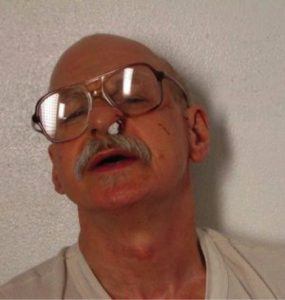Gov. Hutchinson asked to set execution date for death-row inmate Jack Greene, state gets new supply of lethal injection drug
by August 17, 2017 7:01 pm 923 views

Now that the Arkansas Department of Corrections (ADC) has a necessary supply of the lethal injection drugs, Attorney General Leslie Rutledge on Thursday (Aug. 18) sent a letter to Gov. Asa Hutchinson requesting an execution date be set for longtime death-row inmate Jack Greene.
Rutledge’s letter could possibly trigger the formal execution process for the state’s fifth execution this year after she notified the governor that the appeals process and stays of execution have been lifted for Greene.
“Because there is currently no stay of execution in place regarding Greene’s conviction, sentence or currently lethal-injection protocol, this Office, on behalf of the State of Arkansas, respectfully requests that an execution date for Jack Gordon Greene be set,” Rutledge said in her two-page letter.
Under Arkansas law, Gov. Hutchinson is allowed to set the execution dates as he sees fit. J.R. Davis, spokesman for Gov. Hutchinson, said the governor had received Rutledge’s letter but had no response today.
“The Governor will set a date, but there is no specific timeline,” he said.
Greene was convicted of capital murder on Oct. 15, 1993 and sentenced to death in the Circuit Court of Johnson County. He was convicted in 1992 for the 1991 murder of 69-year old Sidney Burnett, a preacher living in Knoxville in Johnson County. According to court reports and media accounts, Greene tortured, stabbed and shot Burnett for helping his ex-girlfriend who was trying to escape from Greene’s abuse. Before killing Burnett, Greene had traveled the week before to North Carolina and shot and killed his brother, Tommy Greene.
John Williams, the assistant federal defender who is representing Greene, said he hopes Gov. Hutchinson will refrain from setting an execution date for Greene since he is not competent to die by lethal injection.
“Today the Attorney General has requested an execution date for a severely mentally ill man. Jack Greene has well-documented brain damage and mental illness,” Williams said in a statement. “He has long suffered from a fixed delusion that the Arkansas Department of Correction is conspiring with his attorneys to cover up injuries that he believes corrections officers have inflicted upon him.”

Williams also said Greene’s “severe somatic delusions cause him to constantly twist his body and stuff his ear and nose with toilet paper to cope with the pain. By doing so, Mr. Greene frequently causes himself to bleed, as can been seen in the below photo.”
In May, Rutledge told Talk Business & Politics the earliest Arkansas could see a restart of the execution process was after a stay of execution expired for Jason McGehee, one of four death row inmates whose death sentence was not carried out due to last-minute legal challenges during the state’s highly-publicized, 8-person lethal injection schedule earlier this year.
Arkansas had received national attention after Gov. Hutchinson set execution dates two at a time for eight inmates over an 11-day period starting April 17 and ending April 27. However, in separate legal actions, stays of executions were granted for Don Davis, Bruce Ward, Stacey Johnson and Jason McGehee.
Ledell Lee was the first inmate to be executed on April 20, the state’s first visit to the death chamber in more than a decade. Marcel Williams and Jones were executed April 24, marking the first time since 2000 a state executed two inmates in one day. Kenneth B. Williams became the fourth Arkansas death-row inmate to die by lethal injection at the hands of the state in the period of seven days on April 27. ADC’s last supply of the lethal injection drug midazolam expired only a few days after Williams’ execution.
As part of the state’s three-drug cocktail, midazolam is first injected by the executioner to render the prisoner unconscious. That is followed by vecuronium bromide to paralyze the inmate, and a final injection of potassium chloride that stops the inmate’s heart and causes death.
ADC spokesman Solomon Graves told Talk Business & Politics that state Corrections officials on Aug. 4 acquired a new supply of midazolam, the controversial sedative that has been at the center of recent court hearings concerning botched executions in Oklahoma and other states.
“Once the Governor issues a warrant, the ADC will be prepared to carry out the sentence,” Graves said.
According to a receipt obtained through a Freedom of Information Act request by Greene’s attorney, ADC Director Wendy Kelley purchased a new supply for $250. The name of the supplier was redacted in keeping with state law passed two years ago that allows ADC officials to keep secret the information about the manufacturer, supplier and other details of drugs to execute death-row inmates.
In late April, inmate Williams’ late-night execution was criticized by his attorneys and local American Civil Liberties Union because some witnesses’ accounts alleged that the midazolam caused involuntary muscular reactions and that he suffered a painful death.
“Midazolam’s well-documented risks and role in numerous botched executions should have given Governor Asa Hutchinson pause. Instead, he ignored the dangers and undermined our state’s moral standing – all to beat the expiration date on a failed drug,” said Arkansas ACLU executive director Rita Sklar.
After Williams’ execution, Hutchinson said he planned to sit down with his staff and ADC officials to determine how to move forward with the state’s execution protocol after the state’s supply of midazolam expired. The governor also said he planned to review the delayed executions of Davis, Ward and Johnson, who all received temporary stays from the courts. Prior to the round of April executions, there were 34 inmates on Arkansas’ death row.
